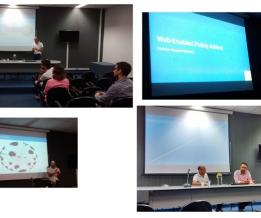scientific diffusion Seminars and Agenda Policy Makers with policy-based simulations - designing equality in Brazil's Education
Policy Makers with policy-based simulations - designing equality in Brazil's Education
CEM/FAPESP post-doctorate research fellow, Davoud Taghawi-Nejad (Ph.D., Economics of Complexity and Creativity, Università degli Studi di Torino), heolds a seminar which discussed presenting information to policy makers using web-based policy simulations. The event, part of a series with post-doctorate fellows from CEM/CEPID, took place at FFLCH/USP.
Abstract: Income inequality has declined steadily in Brazil, but much less is known about the equality of service provision. To test policies intending to increase equality of service distribution in education, the researcher created an Agent-Based Model (ABM) that simulates the education spending on the national, state and municipal levels. He showed at the seminar that the current policy, to redistribute 80 percent of each municipality’s educational budget centrally on the state level, has a positive effect on equality. He finds that an increase in centralization increases distributional equality, but with diminishing returns. He provided a graph that shows the correspondence between centralization and equality of service provision.
POST-EVENT
CEM/FAPESP post-doctorate research fellow, Davoud Taghawi-Nejad (Ph.D., Economics of Complexity and Creativity, Università degli Studi di Torino), held a seminar which discussed presenting information to policy makers using web-based policy simulations. The event, part of a series with post-doctorate fellows from CEM/CEPID, took place at FFLCH/USP.
The paper related to this seminar can be downloaded here. To access the software, click here.
Keywords: Agent-Based Modeling; Brazilian Education System; Equality of Service Provision




